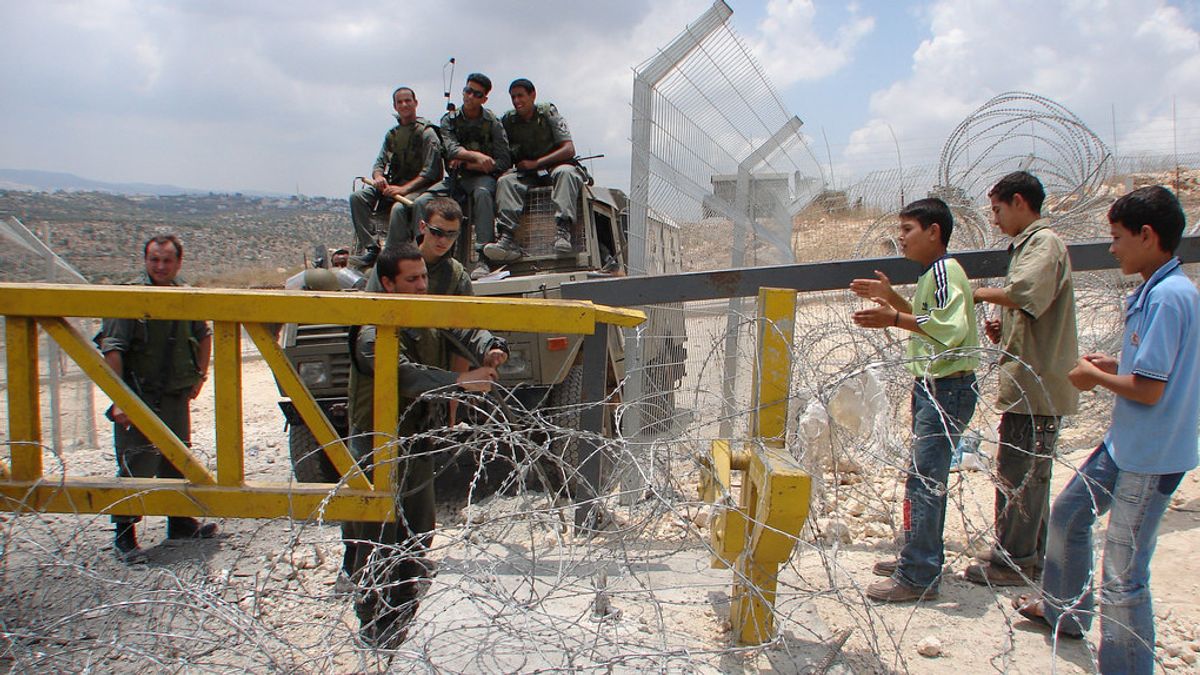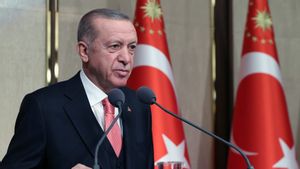JAKARTA - Palestinian militant groups have threatened to resume weekly protests near the Gaza Strip - Israel border, if talks to improve the economic and humanitarian situation in the Hamas-controlled territory continue in place, without significant progress.
The threats were relayed to Israel via Egypt, Qatar, and other mediators, according to Palestinian sources, who said the groups were running out of patience due to lack of progress, in efforts to ease restrictions imposed on the Gaza Strip, citing The Jerusalem Post, Monday, July 26.
The 2018-2019 Gaza Strip border protests, referred to by Palestinian organizers as the 'Great March of Return', were a series of weekly demonstrations in which Palestinians clashed with the Israeli army (IDF).
The demonstrators demanded that descendants of Palestinian refugees be allowed to return to their former villages and towns in Israel. They also protested the blockade of the Gaza Strip.
The Al-Akhbar newspaper affiliated with Hizbullah said Palestinian groups had decided to increase pressure along the Gaza Strip border, after a period of relative calm during the Eid al-Adha holiday.

According to the newspaper, the planned escalation aims to encourage ongoing discussions on issues related to the Gaza Strip, especially the humanitarian and economic situation.
Over the past two days, incendiary balloons have been launched from the Gaza Strip into Israel as part of a decision to escalate tensions along the border.
Palestinian militant groups are in the coming days called for a gradual escalation with Israel, which will start with launching incendiary balloons, Palestinian sources told Al-Akhbar.
"In addition, Palestinian factions are also studying the possibility of 'activating new pressure tools', including the resumption of the Great March of Return", the source said.
Rami Abu al-Rish, a senior official at the Hamas-controlled Economy Ministry, accused the new government in Israel of practicing a policy of "turning hands" into the Gaza Strip, by restricting the entry of various goods, including building materials.
Separately, Egypt recently resumed their talks with Hamas leaders on the possibility of reaching a prisoner swap deal with Israel, moving forward with the reconstruction of buildings damaged during an 11-day military confrontation between Israel and Hamas last May.
"The new contract coincides with the return of the Egyptian engineering delegation to the Gaza Strip to continue the operation to clear the rubble of the destroyed buildings", the source said.
Hamas officials said that the removal of the rubble would be completed within a month, paving the way for the second phase of the reconstruction work.
Israel's restrictions on the entry of building materials and the absence of an agreement on a mechanism for transferring Qatari funds are likely to hinder the start of the second phase of reconstruction, the sources explained.

Hamas and Palestinian Islamic Jihad (PIJ) officials, meanwhile, continued on Monday to issue an ultimatum against Israel. Hamas spokesman Abd al-Latif al-Qanou said more pressure on the Gaza Strip would lead to an explosion.
"Our people will not be patient for too long due to the lack of reconstruction and unwillingness to take action to break the siege", Qanou warned.
Meanwhile, PIJ leader Khader Habib also warned that the continuation of restrictions in the Gaza Strip would lead to an escalation in the region.
"Israel will suffer the consequences for preventing the entry of necessary supplies, and the mediators must pressure Israel to fulfill its responsibilities", Habib stressed.
Hussam Badran, a senior Hamas official, was quoted on Monday as citing the lack of progress due to the lack of political experience and the internal differences of the new Israeli government under Prime Minister Naftali Bennett Badran said that the Israeli government change did not concern Hamas.
"But whenever we feel there is some kind of hesitation and an obstacle to negotiations to put up a ceasefire and lift the siege on Gaza, we will use, in agreement with the factions, various tools to suppress the occupation", he said.
"The main reason the ceasefire negotiations faltered was the change in the Israeli government, which suffered from a lack of political experience and wide internal differences", Habib quipped.
SEE ALSO:
Regarding efforts to rebuild the Gaza Strip, Hamas officials said, experience shows that several countries are not complying with their commitments to help the Palestinians.
"Hamas will not allow any country to use its donations to rebuild the Gaza Strip to suppress Palestinian resistance groups", Badran concluded.
The English, Chinese, Japanese, Arabic, and French versions are automatically generated by the AI. So there may still be inaccuracies in translating, please always see Indonesian as our main language. (system supported by DigitalSiber.id)


















